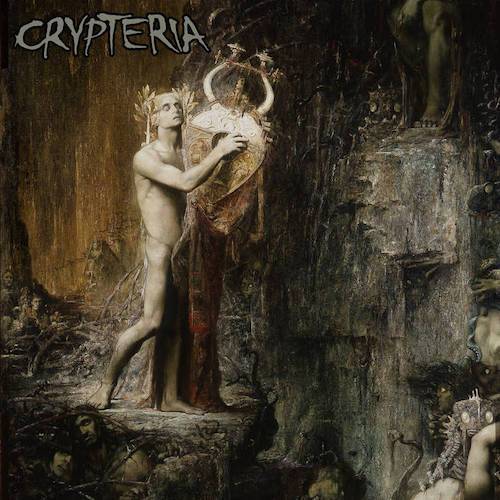We have an out-of-the-ordinary lyric video to present today. The subject matter will be familiar to fans of extreme metal, since at a very high level it concerns the deluding and damaging effects of religious teachings, but the inspirations for the lyrics and their approach to the subject matter isn’t run-of-the-mill at all.
The song that’s presented through the video is “Corrupted Text“, and it appears on the self-titled debut album by the Floridian death metal band Crypteria, which was released last fall and is recommended for fans of Decapitated, Morbid Angel, Soreption, Dyscarnate, and Aborted.
The band’s name is itself thought-provoking, since it refers to the Spartan secret police, a state institution that (as the band explain) “suppressed opposition and controlled the servile Helot population of Sparta”, maintaining order through brutal means. And while Crypteria (the band) didn’t choose the name as an endorsement of merciless repression, their music is undeniably brutal.
As a piece of music, “Corrupted Text” has punishing low-end power and delivers pile-driving grooves that are heavy and hard enough to threaten your skeletal integrity. Along with the skull-battering and gut-punching drum and bass work, Crypteria supercharge the track with vicious jabbing riffs and eerie, flickering arpeggios, while the lyrics are expelled in deep, vehement, roaring tones.
As for those lyrics, they concern the conflict between reason, evidence, and demonstrable truth (on the one hand) and delusion, superstitious, and unreasoning zealotry (on the other) based on religious texts that unwittingly (or perhaps wittingly) incorporated pagan fantasies, and had no foundation in reality to begin with. What specifically inspired them were two philosophical texts, by David Hume and Thomas Hobbes — who aren’t exactly commonplace sources of death metal lyrical inspiration. On the other hand, most death metal bands don’t include in their line-up a teacher of British literature at a college prep school, which is how Crypteria guitarist Austin Burleigh spends his work days.
We want to share with you the details we’ve been given concerning the philosophical foundation for “Corrupted Text”, but for those who would rather first dive into the song, we’ll present the lyric video for the music first:
If you like what you hear, you can check out a full stream of the album — and order it — and the following Bandcamp page:
https://crypteria.bandcamp.com/
And you can follow Crypteria on Facebook at this location.
And now here’s Austin Burleigh‘s commentary on the philosophical texts that provided the basis for “Corrupted Text”:
“Inspired by Hume’s ‘Of Miracles’ and the second half of Hobbes’ Leviathan, ‘Corrupted Text’ mocks belief in miracles and visions, while noting how early Christian writers inadvertently included concepts derived from ancient pagan philosophy into their sacred texts.
“Hume’s essay (1739) explains how people enjoy telling stories than create enjoyment in the listener, while the listener derives pleasure from hearing and thinking about the strange and exciting tale. Meanwhile both the teller and listener are too uneducated and irrational to determine if the ‘marvelous’ story, frequently involving so-called miracles, is true or false:
‘The most ignorant and barbarous of these barbarians carry the report abroad. None of their countrymen have a large correspondence, or sufficient credit and authority to contradict and beat down the delusion. Men’s inclination to the marvelous has full opportunity to display itself. And thus a story, which is universally exploded in the place where it was first started, shall pass for certain at a thousand miles distance.’
“In his entertaining and humorous discussion of how early Christian writers misunderstood, intermixed, and mistranslated Jewish and ancient Greek teachings, Hobbes relates how well-meaning individuals took symbolic language like hell, demons, angels, and eternal punishment, and reinterpreted the metaphors literally, in a way that has harmed mankind and led to a series of grave errors. For instance, Hobbes criticizes the effects of ‘introducing the demonology of the heathen poets, that is to say, their fabulous doctrine concerning demons, which are but idols, or phantasms of the brain, without any real nature of their own, […] such as are dead men’s ghosts, and fairies, and other matter of old wives’ tales’ (Ch. 44).
“Since other metal bands have already exhausted nearly all aspects of religious criticism, Crypteria wanted to take a more philosophical approach to the topic. Expect philosophical considerations in future lyrical material as well; our next album will feature a song inspired by Kantian Idealism, ‘Illusion of Nearness.’
“And here is one more passage from Hume, for those who might be interested:
‘It forms a strong presumption against all supernatural and miraculous relations, that they are observed chiefly to abound among ignorant and barbarous nations; or if a civilized people has ever given admission to any of them, that people will be found to have received them from ignorant and barbarous ancestors, who transmitted them with that inviolable sanction and authority, which always attend received opinions. When we peruse the histories of all nations, we find ourselves transported into some new world; where the whole frame of nature is disjointed, and every element performs its operation in a different manner, from what it does at present. Battles, revolutions, pestilence, famine, and death, are never the effect of those natural causes, which we experience. […] But we soon learn that there is nothing mysterious or supernatural in the case, but that all proceed from the usual propensity of mankind toward the marvelous, and that, though this inclination may at intervals receive a check from sense and learning, it can never be thoroughly extirpated from human nature.
‘It is strange, a judicious reader is apt to say, upon the perusal of these wonderful historians, that such prodigious events never happen in our days. But it is nothing strange, I hope, that men should lie in all ages.’”


